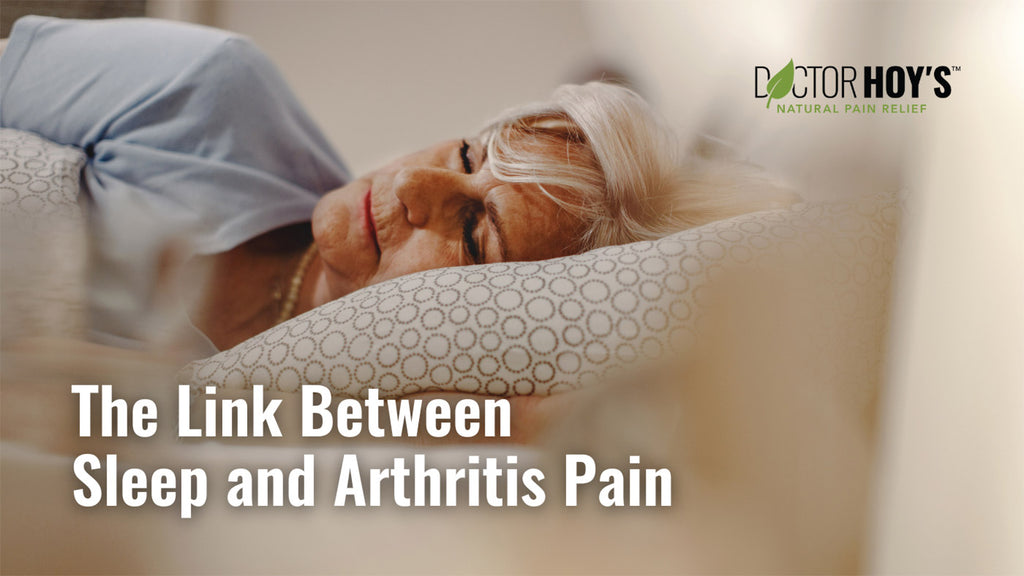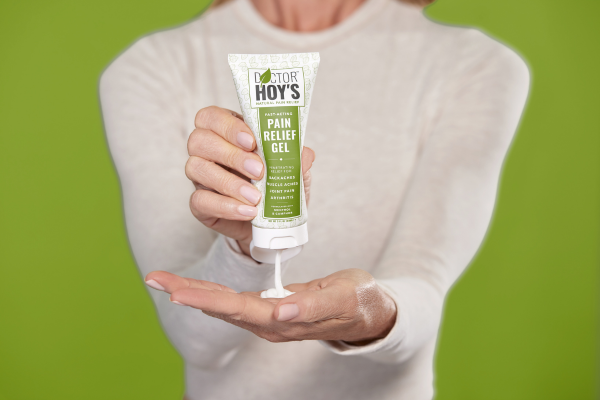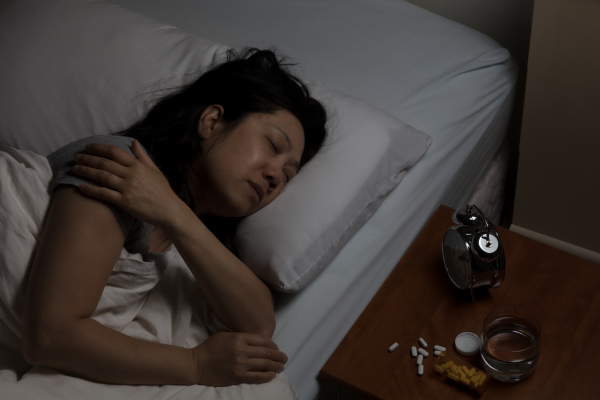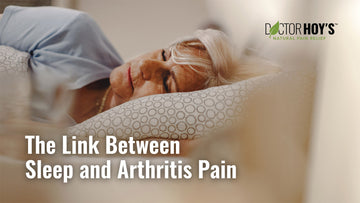The Link Between Sleep and Arthritis Pain
Apr 17, 2024

Is your arthritis worse at night?
Comfortably falling asleep and staying asleep can be hard for people with chronic joint pain. According to the Arthritis Foundation, about 80% of people with arthritis have trouble sleeping. Not only can joint pain make insomnia worse, but poor sleep may intensify arthritis symptoms.
By understanding the link between arthritis and sleep, patients can learn why their arthritis hurts more at night and when to talk to a doctor about nighttime pain relievers like Doctor Hoy’s® Pain Relief Gel, an FDA-approved natural topical gel for arthritis.

Rheumatoid Arthritis at Night
Research shows that sleep problems are significantly greater in people with rheumatoid arthritis (RA), making this the type of arthritis that is often worse at night. However, joint pain at night and trouble sleeping can occur in both patients with RA and osteoarthritis.
A study from 2021 found that about 54.1% of people with RA reported poor sleep quality. Researchers aren’t sure exactly why arthritis pain worsens at night, but reasons can range from your morning medications wearing off by evening to an abnormal immune response.

While symptoms like stiffness, swelling, and aching joints contribute to difficulty sleeping, researchers also note how sleep disorders often lead to more pain and make it harder to find relief. Doctor Hoy’s Natural Pain Relief Gel can be used at night before bed to quickly and effectively relieve pain that makes it hard to fall asleep.
Can arthritis cause sleep problems?
Sleep deprivation produces inflammatory markers in the blood which can lead to long term health issues like chronic pain. A lack of sleep can even increase perceived feelings of pain as the brain and central nervous system cannot regulate this normally.
Sleep disorders are often present even before arthritis develops and two of the most common sleep problems affecting arthritis are obstructive sleep apnea (OSA) and restless leg syndrome (RSL).

Sleep Apnea
With OSA, your airways become partially obstructed and interrupt your breathing as much as hundreds of times a night, waking you up until you can breathe and fall back to sleep. While you likely won’t remember waking up, these short but frequent disruptions greatly disturb your sleep cycle, causing daily fatigue similar to RA.
A 2022 study from a university in Tokyo found that sleep apnea may be linked to increased joint pain in postmenopausal women. More common in men, OSA is often underdiagnosed in women who are not only more susceptible to RA than men but share the same symptoms as RA including joint pain and fatigue.
Severe cases of sleep apnea can be dangerous when left untreated. Many doctors recommend patients with RA have a sleep study performed to determine if sleep apnea may be an underlying cause of their joint pain and fatigue.
Restless Leg Syndrome
RLS can be described as a sudden and irresistible need to move your legs followed by tingling, achiness, or a burning sensation. It usually occurs at night shortly after going to bed and affects up to 30% of people with arthritis.
A sleep disruptor, RLS may not be as severe as sleep apnea, but it can still be problematic for people with joint pain who are trying to fall asleep. You may be able to prevent RLS with daily, low impact exercise like yoga, taking a warm bath, or eliminating distractions before bed.
How to Stop Arthritis Pain at Night
The best topical pain relief for arthritis, Doctor Hoy’s Pain Relief Gel can be used alone or in combination with most arthritis medications. Our powerful, natural anti-inflammatories penetrate deep to relieve joint pain fast. Apply Doctor Hoy’s anywhere you need lasting relief at bedtime or anytime with our topical gel and roll-on gel for hard-to-reach areas.

Using a nighttime pain reliever, practicing good sleep hygiene, and treating underlying causes like sleep apnea can help you get the rest and relief you need. Always talk to your doctor when pain interferes with your sleep so they can help you develop a pain management plan for nighttime relief.
Treatments for rheumatoid arthritis and insomnia can include:
- Medication changes - Your doctor may prescribe a new arthritis medication for nighttime release or change your regular dosing to include an evening dose.
- Keeping a sleep log – A regular sleep log that includes your arthritis symptoms helps identify patterns so your doctor can more easily diagnose potential problems.
- Cognitive therapy – Daily stress is a major trigger for insomnia and arthritis pain. Therapy may help you learn how to cope and set a positive mindset around your pain.
- Lifestyle changes – Sticking to a normal bedtime routine, avoiding caffeine and alcohol, and investing in a supportive mattress are a few minor changes that may improve sleep and alleviate discomfort.
- Seeing a sleep specialist – Your doctor can refer you to a sleep specialist who may conduct a sleep study for proper diagnosis of conditions like sleep apnea. Certain devices, like a CPAP machine, may be prescribed.
Get Natural, Pain-Free Sleep with Doctor Hoy’s
Treating insomnia is essential to managing all types of arthritis. A good night’s rest relieves symptoms like fatigue and inflammation while treating part of the cause of your joint pain. Using Doctor Hoy’s topical arthritis pain relief gel as part of your bedtime routine can help you fall asleep without joint pain.
References:
Arthritis Pain and Sleep Disorders: A Vicious Cycle. (2021, May 7). Arthritis Foundation.
Lerman, S. F. et al. (2017). Psychological interventions that target sleep reduce pain catastrophizing in knee osteoarthritis. PAIN, 158(11), 2189–2195. https://doi.org/10.1097/j.pain.0000000000001023
Odai, Tamami MD, et al. (2022). Sleep apnea in postmenopausal women is associated with joint pain severity and fatigability: a cross-sectional study. The Journal of The Menopause Society. 29(6), 680–686. https://doi.org/10.1097/gme.0000000000001974
Radwan, A., & Borai, A. (2020). Quality of sleep in rheumatoid arthritis patients: Relationship with disease activity, depression and functional status. The Egyptian Rheumatologist, 43(2). https://doi.org/10.1016/j.ejr.2020.08.002
Sleep and Pain. (2022, March 15). Arthritis Foundation.
Villines, Zawn. (2023, August 15) Why are arthritis symptoms worse at night? Medical News Today.



